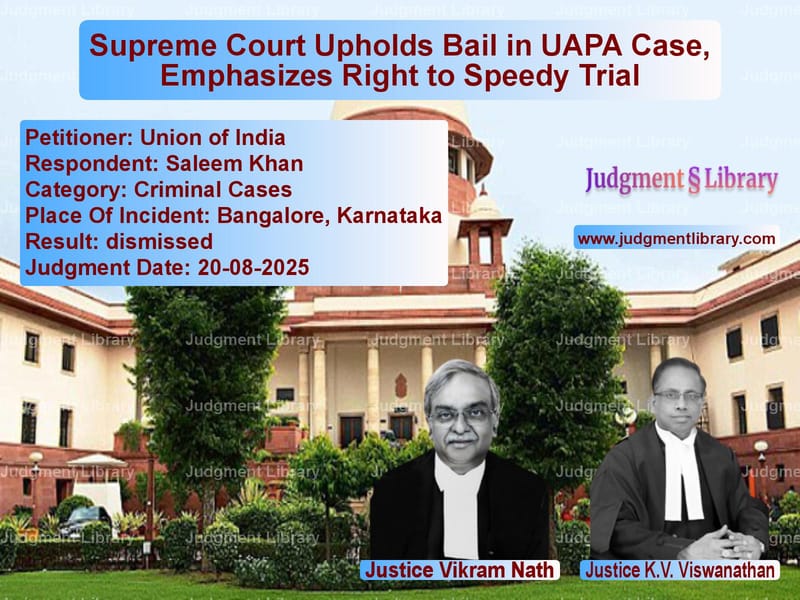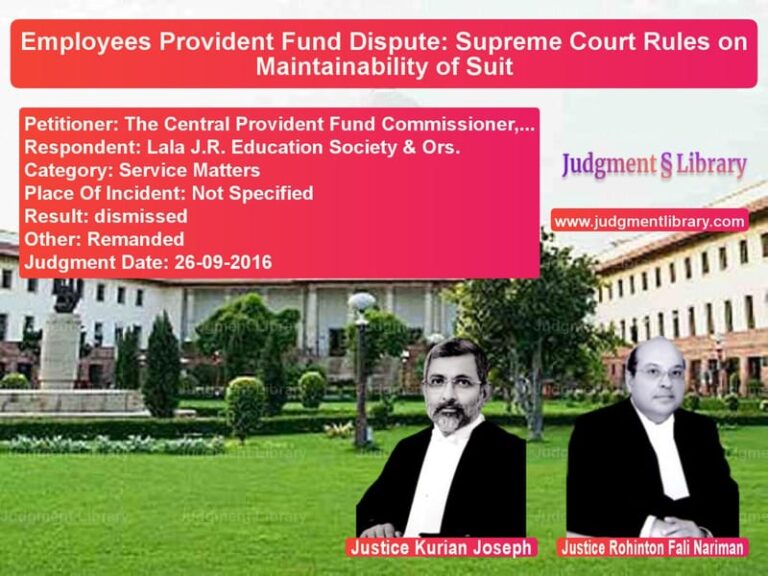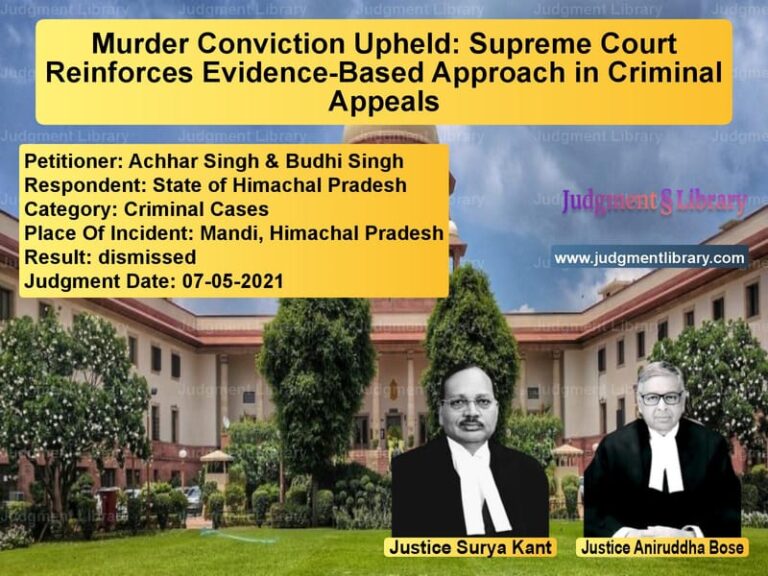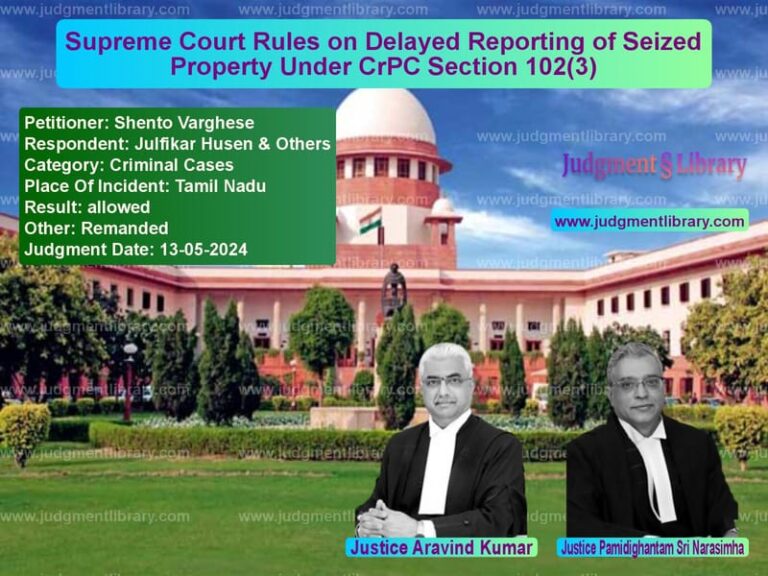Supreme Court Upholds Bail in UAPA Case, Emphasizes Right to Speedy Trial
In a significant ruling that balances national security concerns with individual liberties, the Supreme Court of India has delivered a judgment addressing bail applications under the stringent Unlawful Activities Prevention Act (UAPA). The case involved two accused individuals facing serious terrorism-related charges, with the court taking markedly different approaches to their bail pleas based on the specific evidence against each.
The legal battle centered around Saleem Khan and Mohd. Zaid, both accused in a high-profile case investigated by the National Investigation Agency (NIA). While the court upheld bail for one accused, it denied relief to the other, drawing a clear distinction between their alleged activities and levels of involvement. The judgment also highlighted the critical issue of prolonged incarceration without trial, directing expedited proceedings in terrorism cases.
The Case Background and Charges
The legal proceedings originated from an FIR registered in January 2020 by the Economic Offence Wing of Bangalore Police, which was subsequently transferred to the NIA. The case involved serious allegations under the UAPA, including charges related to conspiracy, terrorist activities, and supporting banned organizations. Saleem Khan was charged under Sections 18/18A/20 and 39 of UAPA read with Section 120-B of IPC, while Mohd. Zaid faced charges under Section 18/20/39 of UAPA and Section 120-B of IPC.
Both accused had been in custody for approximately five and a half years at the time of the Supreme Court hearing, a fact that weighed heavily in the court’s considerations. The prolonged detention without trial became a central concern, reflecting the tension between national security imperatives and fundamental rights of the accused.
The High Court’s Divergent Approach
The Karnataka High Court had previously taken a nuanced approach to the two bail applications, granting relief to Saleem Khan while denying it to Mohd. Zaid. This differential treatment was based on the specific evidence and allegations against each accused. The Supreme Court noted that “the High Court by the impugned order granted bail to the accused no.11, Saleem Khan and by the same order rejected the prayer for bail of accused no.20, Mohd. Zaid.”
The High Court’s reasoning distinguished between the two cases based on the nature of their alleged activities and the organizations they were associated with. This careful differentiation formed the foundation for the Supreme Court’s subsequent analysis and ultimate decision.
Supreme Court’s Analysis of Saleem Khan’s Case
In examining Saleem Khan’s bail grant, the Supreme Court identified several crucial factors that justified the High Court’s decision. The court noted that “the allegations found in the charge-sheet related to his connections with an organisation by the name of AL-Hind, which admittedly is not a banned organisation under the schedule to UAPA.”
This finding was significant because it meant that mere association with AL-Hind could not constitute an offense under UAPA. The court further observed that “to say that he was attending meetings of the said organisation, AL-Hind and others would not amount to any prima facie offence.”
The temporal aspect also played a crucial role in the court’s reasoning. The bench noted that “the impugned order by the High Court was passed on 21.04.2022 almost 3-1/2 years ago and as such, it may not be just and proper to interfere with the same at this stage.” This demonstrated the court’s reluctance to disturb a settled position, especially when the accused had already enjoyed liberty for an extended period.
Mohd. Zaid’s Case: Different Facts, Different Outcome
In contrast to Saleem Khan’s situation, the Supreme Court found compelling reasons to deny bail to Mohd. Zaid. The court noted that “the High Court has found his involvement with banned terrorist organisations, his active role in operating dark web and assisting the members of the banned terrorist organisations.”
The evidence against Mohd. Zaid appeared more substantial and directly linked to prohibited activities. The court emphasized that “the reasons given by the High Court are based upon the material collected during investigation and as reflected in the charge-sheet.” This indicated that there was documented evidence supporting the serious allegations against him.
Additionally, the court noted that “the High Court further noticed the involvement of accused no.20 in another case under UAPA,” though it acknowledged that he had been granted bail in that separate case by the Madras High Court.
The Critical Issue of Prolonged Incarceration
Perhaps the most significant aspect of the judgment was the Supreme Court’s strong stance on the right to a speedy trial. The bench expressed deep concern that “the trial has not commenced despite lapse of 5-1/2 years.”
In a powerful assertion of constitutional principles, the court declared that “Accused cannot be allowed to languish in jail without being given a fair and speedy trial.” This statement reflects the court’s commitment to balancing security concerns with fundamental rights, even in cases involving serious allegations under anti-terrorism laws.
The court took proactive measures to address this systemic issue by directing that “the Trial Court be directed to expedite the trial and conclude the same within a period of two years considering that there are more than 100 witnesses to be examined by the prosecution.”
Practical Directions for Expedited Trial
Recognizing the practical challenges in complex terrorism cases, the Supreme Court issued specific directions to ensure timely disposal. The court mandated that “The prosecution is also directed to ensure full cooperation in leading the evidence and getting the trial concluded within the time specified above.”
The judgment also imposed responsibilities on the accused, noting that “It also goes without saying that the accused will also extend full co-operation in the conduct of the trial in particular accused no.11, who has been released on bail.”
Importantly, the court provided a safeguard mechanism, stating that “The Trial Court or the prosecuting agency would be at liberty to apply for cancellation of bail of accused no.11, in case it is found that he is trying to delay the trial.” This balanced approach ensures that the grant of bail doesn’t become an instrument to obstruct justice.
Broader Implications of the Judgment
This Supreme Court ruling carries significant implications for the interpretation and application of UAPA provisions in bail matters. The judgment demonstrates that even under stringent anti-terrorism laws, courts will carefully examine the specific evidence against each accused rather than applying blanket restrictions.
The court’s differentiation between association with banned versus unbanned organizations provides important clarity for future cases. Similarly, the strong emphasis on the right to speedy trial establishes that prolonged detention without progress in trial proceedings cannot be justified indefinitely, even in serious cases.
The judgment also reflects the judiciary’s role as a balancing force between state security interests and individual liberties. By upholding bail in one case while denying it in another based on factual distinctions, the court has shown that each case must be evaluated on its own merits rather than through generalized assumptions.
This approach ensures that the draconian provisions of laws like UAPA are applied judiciously, protecting both national security and the fundamental rights guaranteed by the Constitution. The directive for time-bound trial completion further reinforces the judiciary’s commitment to ensuring that justice is not only done but seen to be done within a reasonable timeframe.
Petitioner Name: Union of India.Respondent Name: Saleem Khan.Judgment By: Justice Vikram Nath, Justice K.V. Viswanathan.Place Of Incident: Bangalore, Karnataka.Judgment Date: 20-08-2025.Result: dismissed.
Don’t miss out on the full details! Download the complete judgment in PDF format below and gain valuable insights instantly!
Download Judgment: union-of-india-vs-saleem-khan-supreme-court-of-india-judgment-dated-20-08-2025.pdf
Directly Download Judgment: Directly download this Judgment
See all petitions in Bail and Anticipatory Bail
See all petitions in Terrorist Activities
See all petitions in Judgment by Vikram Nath
See all petitions in Judgment by K.V. Viswanathan
See all petitions in dismissed
See all petitions in supreme court of India judgments August 2025
See all petitions in 2025 judgments
See all posts in Criminal Cases Category
See all allowed petitions in Criminal Cases Category
See all Dismissed petitions in Criminal Cases Category
See all partially allowed petitions in Criminal Cases Category







